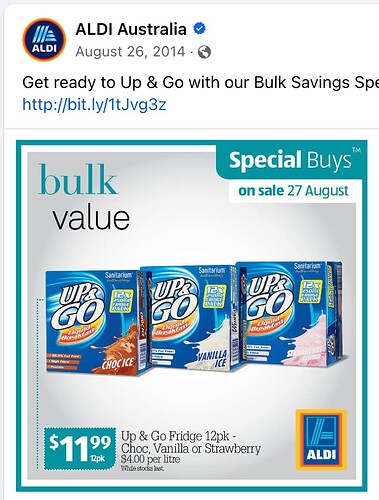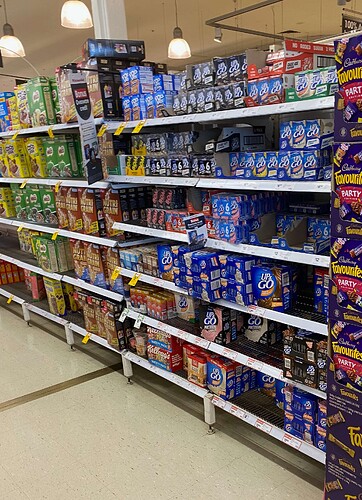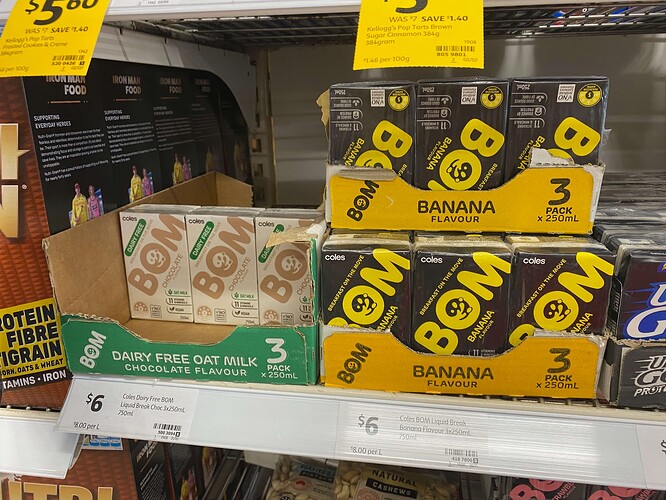Here you can post your reasons why or why not to buy at ALDI. Remember to keep the discussion about evidence based reason, though opinion is welcome as long as it remains within Community standards regarding civility.
Two nights ago during 10 News I saw that Aldi ad where the products I noticed were Up & Go and Bega. Tonight on 10 News I saw an ad for Up & Go… so it is actively advertising so that would significantly affect the price. Note I think Aldi’s version is called “Quick 2 Go”. I think I’ve also seen a Bega ad recently.
An interesting article which might explain Aldi’s lower prices and its unpopularity with other companies.
How Does Aldi Get Away With So Many Copycat Products?
By Jess Jeziorowski|Dec. 12, 2023 11:15 am EST
From the dailymeal com
Aldi is known for its minimalistic stores and low prices. Shoppers flocked there as recent inflation rates and food prices climbed, searching for a way to buy groceries without breaking the bank. What keeps people coming back are those low prices and copycat products that taste like the real thing. People want the same things they can find at Whole Foods or Wegmans but cheaper and with the same quality they’re accustomed to, so places like Aldi do that for customers. But if you wonder how it can get away with selling so many copycat products, there’s an explanation.
…It’s called brand imitation, and it’s not illegal, but it is a very fine line to tread. The key to this strategy is to have just enough difference in packaging, branding, and ingredients to avoid a lawsuit, which is called comparative advertising. Manufacturers spend a lot of money to develop memorable attention grabbing branding on their packages, ensuring you immediately recognize the product. It’s far more common to trademark brand names and logos; it’s not so common to trademark packaging and product shapes. Aldi and other budget stores take advantage of this by taking cues from well-known brand packaging and logos and tweaking them for their own branding, then choosing a different name. This way, Aldi doesn’t need to spend millions on developing a recognizable brand and a reputation — it’s already been done for them. They can count on shoppers to recognize what they’re buying and skip buying the name-brand products in favor of Aldi’s private brand.
On the topic of Up & Go and Aldi:
On Facebook August 26, 2014 they posted this:
As I said in my previous post Aldi now sells “Quick 2 Go”.
That Up and Go is a “special buy” and is not necessarily a common product they sell, though they may also include it as part of their normal lines.
This is my original post about the Aldi ad which hasn’t been moved in this new thread:
Tonight [Sunday June 23] I saw an Aldi ad that compared Aldi with a competitor. It said that Aldi was 31% cheaper.
The Aldi products were all generic while none of the competitor’s products were generic. They all seem to be well-known (i.e. had used advertising) brands and products like Bega and Sanitarium’s Up and Go.
Though at a glance the Aldi generic products look like premium brands and products.
Aldi is probably still cheaper overall but I think that ad was misleading.
It possibly would have been misleading in the past, but Choice’s survey released last week has changed the goal posts. This allows Aldi to compare pricing directly with branded products, even if these branded products aren’t actually the same as Aldi store branded products. If challenged, they can use the Choice survey as a defence.
@phb
In the ad I think the branded products it was comparing it to were all ones that have been advertised on TV (or at least pay Coles/Woolworths to place them prominently). These are compared to unadvertised copycat products.
Why or why not shop at ALDI?
Why not? For me, it’s about convenience. My intention with shopping of any kind is to get to, from, into and out of the shops, and find what I want, quickly and easily.
I very rarely go into ALDI, although the one literally next door to the Coles I often shop at in a small suburban mall nearby meets the convenient-access criterion.
However - when I do venture into ALDI, it’s usually for just one or two things, and even then I often don’t find what I’m looking for. So I’d not be able to head in there with my weekly shopping list and come out with all of it.
Which rules it out for me as a regular source of groceries etc, other than an occasional once-off purchase. That’s usually of something CHOICE recommended (such as washing powder or dishwasher tablets).
So on Sunday night during 10 News I saw an Aldi ad that compared famous brands with Aldi copycat products which included “Up & Go” (vs “Quick 2 Go”) and Bega. Last night (Tuesday) I saw an ad during 10 News for “Up & Go”. Well today at Coles from the top to the bottom of the start of the breakfast aisle there was just “Up & Go”… So in addition to prime time ads, “Up & Go’s” makers would be paying Coles quite a lot for that prominent placement - which are costs that Quick 2 Go wouldn’t require.
I don’t think it was an accident that Aldi included “Up & Go” in their ad at the same time that “Up & Go” was having a major advertising campaign (with special placements on Coles’ stores).
I noticed something interesting on those shelves - the plain Coles brand version was about the same price ($6 for 3). “Up & Go” is $12 for 6 (next to the Coles ones) or $6.50 for 3 (further away) and that’s the normal price.
I now live in a state without Aldi, but had experience with Aldi when we lived in Brisbane.
In Brisbane (4 years + ago), our nearest Aldi was about a 10 minute drive. Both Woollies and Coles were closer.
We would drop into Aldi from time to time, mainly because the other half had seen special buys which were of potential interest.
We would look at the groceries, but as we don’t buy a lot of highly processed foods or foods ‘made in Australia’ from imported ingredients (unless there are no alternatives), many of the product didn’t suit our everyday needs.
We would buy the occasional bag of muesli and have used their Mama nappies when travelling (noting we mainly used modern cloth nappies 95% of the time). Sometimes we would get the odd special buy, but often found they didn’t have the longevity of products we have bought elsewhere. Examples include LED lights which didn’t work out of the packet or only lasted months rather than years where they should), kitchen gadgets, power/gardening tools which died after a couple of years and shorter than one would normally expect with a quality brand.
Getting parts for broken bits was also very difficult as often their suppliers don’t provide spare parts - I did get the impression they treated them as disposable items rather than something to fix. This does go against my own views on consumerism.
Children books were okay, but some of the printing and binding quality wasn’t as good as from reputable bookstores - which possibly is okay if one doesn’t want to keep them forever. Some clothing/children clothing was hit and miss. Some reasonable quality (e.g. some ski gear and jackets) while others didn’t last the length of time that they could have been worn (more fast fashion quality).
We found that one couldn’t rely on quality across all products all the time.
In the months before moving, we no longer shopped at Aldi as I was starting to get concerned that we were becoming buyers of cheap items only to generate more waste in the longer term. It is worth noting that we have family and friends who are avid Aldi shoppers. They have had similar experiences with special buys, but seem to take the attitude that it was cheap and getting a year or or two use is acceptable as they saved a lot when buying. I am unsure if it is a cheap way to buy in the longer term … or sustainable from a waste/environmental point of view.
If they opened in our state, I possibly wouldn’t visit them…well maybe only if a good German friend visited us around Christmas as he tends to like the imported Christmas assortments/treats from Germany.
I just remember that something I didn’t like was the special buy section. I recall once being pushed around when looking at the ‘tables/bins’ because other shoppers seemed to be in a state of panic buy. Also, towards the end of the special buy week, often things had been sold out and/or hard to find as some parts of the special buys area looked like a bomb had gone off from shoppers rummaging through stock.
Once upon a time I was a sales assistant in a department store that had ‘specials tables’ frequently. In some departments the boss would insist that everything had to be neat and tidy so that items were squared away and in order of size, colour etc. In others they didn’t bother quite so much as long as things were not total chaos as we had better things to do than spend all day tidying mess that would revert in an instant.
Then there was the Sales Manager who, particularly in the women’s clothing department, would go though tossing stuff into the air to make a messy heap if the tables looked too tidy. He would tell us that this encouraged women to sort through them and buy. He was looking for a trigger to initiate the feeding frenzy. The staff ladies who had just tidied them up, because they could never answer the question “Do you have this in size 14?” while it was a mess, were not impressed.
Marketing is a wonderful thing, it grips the mind and takes one to far away places regardless of the side of the transaction one is on.
I’ve never been a ‘shopper’ of Aldi’s. Sure I’ve gone in to ‘have a look’ during the past years but invariably went away without shopping. Somehow the store with the items on the shelves in the boxes they came in always seemed a bit strange, a largish grocery shop with very limited stock and almost no known brands to look for: where were Kellogg’s, Arnott’s biscuits, IXL jam…? Why were the chocolate wafers made in Saudi Arabia? Why did customers have to pay for shopping bags and do the packing themselves? Why were there no assistants around, you had to ambush them when they came out of the store room with their packed boxes, and the poor things had no idea of anything else other than stocking the shelves.
The Aldi label on any gifts was embarrassing because we all knew it had been cheap.
I decided that the thing to do was to ignore it and stay away, and it’s been easy to do because the Aldi stores in Stkilda are very few and far between.
The survey by Choice about the ‘cheapest supermarket’ caught me by surprise. Apparently Aldi has grown a lot by getting more generic products called private label/house brand which have copycat taste and looks, and has built its own business around them. Brand imitations with just enough difference to avoid a law suit but similar enough to grab customers attention and remind them of similar branded products, but at a cheaper price. The saving on development investment and marketing costs must be enormous.
So now Aldi has been declared the cheapest supermarket by the Choice survey, a promotion worth millions without having spent a cent. Taxpayers money has been used by the government to fund the survey.
I will still stay away from Aldi but now I can’t help admire their business acumen.
The nearest Aldi to me is only a couple of km away, and I find that its fresh produce is likely to be of better quality than Coles. Special buys? I’ll meander through every so often but its a rare event that I’ll buy. The last thing was one of those fake mink blankets which are as warm as toast… I have two, and havent needed an electric blanket ever since.
This opinion is a “work in progress” as it’s still an emerging observation. I occasionally shop at Aldi for all the usual reasons, and particularly because I figure some staple items seem as good as the more expensive alternatives in other stores. I’ve recently started using the Yuka app that allows me to scan and compare items to see what sorts of nasties they might contain, like additives, sodium, sugar and fat content. Many of the Aldi products are coming up as inferior quality from a health perspective, so I’m now more circumspect about whether saving money is really my priority. Not to say I’ll be avoiding Aldi, but I’m reassessing the products I’ll buy from there.
Assuming one accepts the values behind the Yuka App, how does it score the similar products sold by the other supermarkets?
Compared to Aldi’s own brand, I’ve been able to find healthier options (as reported by the Yuka app which does seem to reflect what’s listed on the item) at other supermarkets because they have a wider range to select from. Often the higher quality product is more expensive but not necessarily.
This has been found by independent organisations showing in average, Aldi store branded products have lower nutritional value than other supermarket store brands:
Lower nutritional value results in lower health stars. This generally means overall higher salts, sugars and fats.
As is often said, cutting costs often comprises quality. And saving money pushes costs elsewhere, possibly that relating to one’s health.
Buying the cheapest isn’t often the best value. Yuka app would only be reflecting results found by others.
A supermarkets comparison from news.com.au
Woolworths, Coles and Aldi compared
MULTIGRAIN BREAD
Aldi bread is the cheapest, but it has a lot more sugar. You’re better off paying a bit more at Coles and getting something with less sugar. When we compared the multigrain loaves at Aldi, Coles and Woolworths, the Aldi loaf contained added sugar, which is unusually in a bread giving it 4 per cent sugars compared to both the Coles and Woolworths loaves which contained just 2.5 per cent overall sugars. The wholegrain content of the Aldi loaf was slightly higher at 20 per cent than the Coles loaf which contained 17 per cent wholegrains.
MUESLI
A closer look at the labels of home brand fruit mueslis show that while the Aldi brand is lower in overall sugars, this is largely as it has a lower overall fruit content than both the Coles and Woolworths muesli with Aldi containing 11.7 per cent fruit, Coles 35 per cent fruit and Woolworths 22 per cent.
That’s really interesting. I don’t think there’s good awareness around that. The Yuka app aims to help users to make informed decisions by pulling in the data from the products and relating it back to existing research. The developers go to lengths to affirm their independence so I’m taking that at face value for now and have found it a convenient way to make choices on the spot. Good to have my suspicions further validated by the links you’ve posted here. Thanks!


